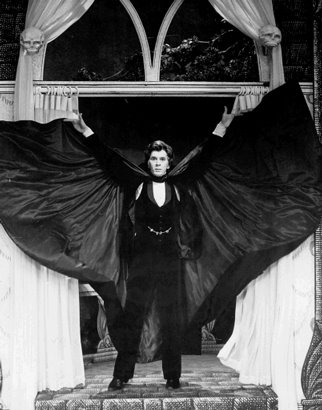The Vampire Image in Fiction and Film
Q3 - 2008-2009 -- Period Three
In this class, students will study portrayals of the vampire image in folklore, fiction, and film. Students will have the opportunity to explore the cultural, mythological, and historical origins of this popular and long-lasting persona and why this image is so appealing. Students will delve into the literary roots of the vampire by reading and discussing elements of the European Gothic tradition starting with Polidori's "
The Vampyre." As a class, students will closely analyze Bram Stoker's
Dracula, focusing on themes, character development, and the historical context of the novel's entry into the literary canon. To visually complement the themes and images presented in the written texts, students will view Murnau's 1922
Nosferatu, Ford Coppola's 1992 film version of
Bram Stoker's Dracula, and if time permits--Merhige's
The Shadow of the Vampire. Other film clips will also be used to study the various portrayals of the vampire in the last century.
General Class Requirements:Warning: this class requires a large amount of reading with required homework. - Each student will be required to read and analyze Bram Stoker's Dracula in small and full group discussions. Reading on schedule and participation in group projects/discussions is required to earn credit. Individual and group work will consist of standard literary analyses, vocabulary work, reader response discussions, and creative assignments. Although some reading days will be scheduled, it is expected that students complete the majority of their novel reading outside of class time. Please plan accordingly.
- Students are expected to read and respond to short stories, folklore samples, and historical context chapters on the gothic tradition and vampire image.
- The class will also have the opportunity to analyze the genre through contemporary film. Response journals and discussions in reaction to the story, production, characterization, or other film characteristics will be required.
- Respectful and appropriate use of class time is expected from all students on all days. Any students who disrespect their classmates/instructors, quiet film viewing, silent reading time, or focused discussion sessions will simply be marked absent for the class period.
Evaluation Breakdown:Students will be assessed on : Attendance and Consistent Participation – 20%
Dracula Quizzes and Final Individual Project – 40%
Group Work / Reading Roles – 20% (group members have input on this assessment)
Journal Entries & Other Assignments – 20%
Missing and Late Work:* This is considered a college-prep. class; guidelines and work load are established accordingly. Assignment due dates must be firm. Students will lose 25% of an assignment value for each day it is late. If a student has a FT or a partial day absence, they are still responsible for meeting assignment due dates. (The only exceptions to this guideline may occur for students with documented special education writing concerns. Those students must have a dialogue with me about those concerns in the first week of the course. Permission for extensions must be in line with a student’s IEP and requested in advance of the due dates.)
* All students are responsible for knowing the due dates on assignments. Look at your assignment handouts, the whiteboard reminders, and the class online site. Ask a classmate.
Attendance Requirements:* If you are absent, you are still responsible for what you missed in class. Ask a fellow classmate what was done the day before and check the assignment basket for handouts or assignments.
* The Shabazz attendance policy will be strictly enforced in this class. Students will be dropped after their 6th absence. Remember that all tardies are accounted for (3 tardies = 1 absence). If an emergency arises, inform Denise and the office immediately.
Book Returns:Students must return all books and materials checked out for class to be eligible for credit. If a book is lost, talk with Denise about where you can find a replacement copy or arrange for payment of the text.
Tentative Quarter OutlineWeek One January 27 – 30 (4 days)
Introduction to Course / Brainstorm on Vampire Image / Vampire Folklore and
Myth (video)
Week Two February 2 - 6
Vampire Folklore / Creative Vamp Project / Historical Vampires
Week Three February 9 - 13
View Murnau's Nosferatu / The Gothic Tradition / Polidori's "The Vampyre"
Week Four February 16 - 20
Discuss Polidori’s Vampyre / Historical Context of Stoker’s Dracula / Begin Dracula Reading, Group Work, and Discussions
Week Five February 23 – 27 (3)
Mid-Q Reports / Parent Confs / SWEIO Reading and Dracula Groups
Week Six March 2 - 6
Dracula Groups and Discussions / Quiz #1
Week Seven March 9 - 13
Dracula Groups and Discussions / Quiz #2
Week Eight March 16 – 20 (4)
Finish Dracula / Quiz #3 / Individ. Projects
Week Nine March 23 - 26
View Bram Stoker’s Dracula (Coppola)







